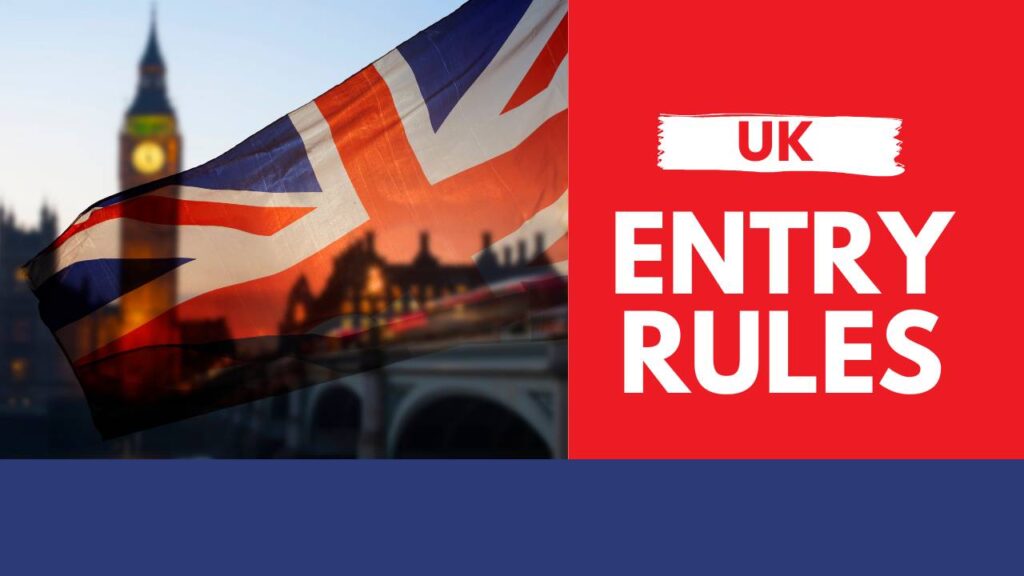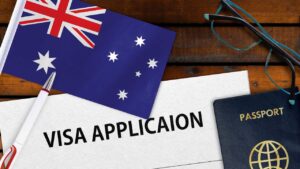Navigating UK Entry Rules has become increasingly vital as the United Kingdom continues to tighten its immigration protocols and modernize its border control systems. Planning a short holiday, pursuing world-class education, or relocating for employment, it’s essential to understand the various regulations, visa types, and procedural steps involved in gaining lawful entry into the UK.
Failing to understand or comply with these rules can result in delays, denials, or even bans on reentry. The UK’s immigration system is now more structured, tiered, and purpose-driven—each category of traveler must fulfill specific requirements depending on the nature and duration of their stay. As a result, all travelers—be it tourists, students, or workers—need to stay informed and up to date with every requirement.
This guide outlines everything you need to know about UK Entry Rules in 2025, offering detailed insights into eligibility, required documents, types of visas, new technologies like ETA, and post-Brexit policy shifts affecting global mobility.
Why Understanding UK Entry Rules Is Critical in 2025
In the post-Brexit world, the UK has completely restructured its immigration framework to focus on a points-based system, digitization, and stricter screening processes. These changes affect not only EU nationals but also citizens from all parts of the world seeking to enter the UK. The government’s approach now leans heavily on skills-based migration and controlled tourism, aimed at protecting domestic interests and labor markets.
Understanding UK Entry Rules is essential because even small errors or misunderstandings—such as applying for the wrong visa type or omitting important documents—can lead to costly rejections or travel disruptions. Unlike in previous years, immigration officers now have greater authority to assess intent and deny entry even if all documents appear correct.
UK Visa Application for Tourists, Students, and Work Permits – 2025 Update
Because entry requirements are often updated without much prior notice, it is essential to consult official resources regularly. By staying informed and compliant, you not only protect your travel plans but also ensure that you do not unintentionally violate UK law, which could have long-term immigration consequences.
UK Entry Rules for Tourists
1. Visa-Free Travel & Standard Visitor Visa
Tourists from visa-exempt countries such as the USA, Canada, Japan, and most EU nations are permitted to enter the UK for up to six months without applying for a visa. Travelers must still abide by entry rules that prohibit engaging in paid work, studying, or accessing public funds during their visit. Even without a visa requirement, tourists should carry documents proving the purpose of their trip, such as return flight tickets, hotel reservations, or invitations from UK residents.
For travelers from visa-required countries—including India, Nigeria, and Pakistan—a Standard Visitor Visa is mandatory. The visa must be applied for online and typically takes around 15 working days for processing, although it may vary depending on seasonal demand and local embassy schedules. In some cases, additional documentation or in-person interviews may be required to verify your travel intent and financial standing.
Providing complete, truthful, and verifiable information during your application is critical. Any discrepancies or red flags can lead to visa denial. Moreover, visitors should be aware that overextending their stay or engaging in unauthorized activities can result in future entry bans.
2. Electronic Travel Authorisation (ETA) System
The UK is implementing the Electronic Travel Authorisation (ETA) system to enhance border security and simplify immigration processing. This digital pre-screening system is expected to be fully operational for all visa-exempt countries by the end of 2025. Under this system, travelers will need to obtain an electronic permit linked to their passport before traveling to the UK.
The ETA is a relatively simple online process, usually approved within 72 hours, and is valid for multiple entries over a two-year period or until the passport expires. Applicants may be asked for background information, travel history, and contact details during the process. Authorities will use this data to assess potential security threats or immigration violations before the individual boards a flight.
Failure to apply for or receive an ETA could mean being denied boarding at your departure airport. Therefore, travelers are strongly advised to complete this process well in advance of their travel date. As the ETA becomes mandatory, it will eventually replace the traditional landing cards and further reduce processing times at UK borders.
3. Border Interview & Entry Clearance
Even with a valid visa or ETA, final clearance is granted only upon arrival at a UK airport or port. Border Force officers conduct random or targeted interviews to assess the intent of travelers. These interviews are routine but can be intense, especially if discrepancies arise between your documents and your responses.
Travelers should be prepared to answer detailed questions regarding the duration of stay, financial arrangements, itinerary, and accommodation. If you’re staying with friends or family, you may need to provide their address and contact details. Officers may also ask for evidence such as printed reservations, bank statements, or letters of invitation.
Being confident, honest, and organized significantly improves your chances of smooth entry. If officials find inconsistencies or suspect potential overstay, you may be detained for further questioning or refused entry. Therefore, always keep copies of your visa, flight information, and travel plans on hand during arrival.
UK Entry Rules for Students
1. Student Visa (Formerly Tier 4)
International students must apply for a Student Visa to study at a recognized UK educational institution. The process begins with receiving a Confirmation of Acceptance for Studies (CAS) from your university, which acts as proof of admission. The visa covers the course duration, with additional months granted for preparation and travel.
To qualify, applicants must demonstrate their ability to fund tuition and living expenses. This is typically done by showing bank statements, scholarships, or official sponsorship letters. Additionally, applicants from non-English-speaking countries must pass an English language test such as IELTS or TOEFL unless the course itself is delivered in English by a recognized provider.
Upon arrival, students must collect their Biometric Residence Permit (BRP), which acts as their legal ID in the UK. Attending scheduled classes and complying with work restrictions is essential, as any breaches may lead to visa cancellation and future travel bans. Moreover, many institutions now integrate visa monitoring systems, which alert authorities in case of non-compliance.
2. Graduate Route (Post-Study Work Visa)
The Graduate Route Visa allows international students who complete a UK degree to stay in the country for up to two years (or three for doctoral graduates) to work or look for work. No job offer or sponsorship is required, making it a flexible option for recent graduates exploring the UK job market.
This visa opens doors for gaining valuable international experience, participating in internships, or launching your own startup. During this period, you are permitted to switch employers and industries, which adds significant career flexibility. You can also work full-time without salary thresholds, which makes it an attractive pathway for both graduates and UK employers.
After gaining relevant experience, individuals can transition into the Skilled Worker Visa or other long-term immigration categories. Having UK work experience significantly increases your eligibility and eases the transition into permanent residency or further educational opportunities.
UK Entry Rules for Workers
1. Skilled Worker Visa
The Skilled Worker Visa is now the UK’s primary route for hiring foreign professionals. To be eligible, individuals must secure a job offer from an employer licensed by the UK Home Office. The job must meet specific salary and skill thresholds, usually around £26,200 annually or £10.75/hour, although exceptions apply for shortage occupations.
Applicants must also pass an English language requirement and receive a Certificate of Sponsorship (CoS) from their employer. The application includes biometric verification, a tuberculosis test (if required), and payment of the Immigration Health Surcharge. This visa can be granted for up to 5 years and provides a pathway to settlement.
Skilled Worker Visa holders are allowed to bring dependents and access certain public benefits, although they must notify the Home Office of any changes in employment. Frequent job switching may require a new visa application or employer sponsorship. Maintaining compliance is key to remaining in good standing.
2. Health and Care Worker Visa
The Health and Care Worker Visa is a special subcategory designed to fast-track medical professionals into the NHS and care sectors. With labor shortages in the healthcare field, this route offers lower visa fees, faster processing times, and exemption from the Immigration Health Surcharge.
Eligible applicants include nurses, doctors, healthcare assistants, and other allied professionals such as radiographers or paramedics. Employers must still provide a CoS and verify that the role meets the public health sector salary threshold. Family members can also apply as dependents and benefit from the same streamlined conditions.
This visa is often processed in as little as three weeks, making it one of the most efficient UK work visas. Over time, it also offers a path to settlement and citizenship. The UK government continues to invest in this category to fill gaps in the healthcare system and reduce the burden on the NHS.
3. Global Talent & Business Visas
For individuals with extraordinary skill sets or entrepreneurial ambitions, the UK offers several flexible visa routes:
The Global Talent Visa is for leaders or emerging talents in digital technology, science, engineering, and the arts. Endorsement from a recognized body like Tech Nation or Arts Council England is required.
The Innovator Founder Visa is ideal for entrepreneurs launching innovative, scalable businesses. Applicants must present a viable business plan and receive an endorsement from an approved endorsing body.
The High Potential Individual (HPI) Visa targets graduates from top international universities. It does not require a job offer and allows job hunting or starting a business in the UK.
These visas do not require sponsorship, offer extended durations, and open pathways for long-term settlement, making them popular among tech entrepreneurs, researchers, and international founders looking to scale their ideas in a robust economy.
Common Mistakes to Avoid
Even minor errors can completely derail your UK travel plans, resulting in delayed processing, visa refusals, detentions at the airport, or even long-term bans. Whether you’re a tourist, student, or skilled worker, avoiding these common pitfalls can save time, money, and emotional stress.
1. Applying for the Wrong Visa or Skipping ETA Registration
Many travelers mistakenly apply for the wrong visa category—such as using a tourist visa when their actual intent is to attend a short course or unpaid internship. Each visa has a specific purpose, and mismatches can be flagged as “misrepresentation” by UK Visas and Immigration (UKVI).
Likewise, travelers from visa-exempt countries sometimes assume they can simply show up without completing the Electronic Travel Authorisation (ETA) process. Skipping ETA registration—now mandatory for many nationalities—can result in being denied boarding at your departure airport. Always research the correct visa or authorization based on your country of origin and travel purpose before booking your ticket.
2. Providing False, Incomplete, or Inconsistent Information
Inaccurate answers or missing information on your visa or ETA application can trigger automatic denials or future visa bans. This includes errors in your travel history, finances, employment status, or purpose of visit. Even slight discrepancies—such as differing arrival dates between your visa form and your airline booking—can raise red flags.
UK immigration officials use advanced systems to cross-check your application data with previous travel records and third-party databases. Never lie or guess information. If you’re unsure about any question, seek guidance from the official UK government immigration site or consult a certified immigration advisor.
3. Ignoring Application Deadlines & Processing Times
A very common mistake is applying too late, especially during peak travel seasons or just before university enrollment. Visa processing can take anywhere from 15 working days to several months depending on the visa category, local embassy load, and your individual case.
Always factor in buffer time for potential delays, additional document requests, or postal delays for your passport return. For students and workers, late visa issuance could mean missing your course start date or job joining deadline, which can affect your immigration status and future applications.
4. Violating Visa Conditions (Overstaying, Working Without Permission)
One of the most serious mistakes is overstaying your visa or engaging in unauthorized activities like working while on a tourist visa. These actions not only lead to immediate deportation but also to multi-year entry bans and a tarnished immigration history.
Students must avoid working more hours than allowed or taking on full-time roles during term time. Workers must ensure they do not switch employers or job roles without updating their sponsorship. Always know the specific rules tied to your visa type, and make sure to leave the country or apply for extensions before your visa expires.
5. Not Carrying the Right Documents Upon Arrival
Some travelers assume that getting a visa is enough and overlook the importance of carrying physical proof of accommodation, financial means, travel insurance, or return flight bookings. UK Border Officers often request this information—even from those with valid visas or ETA approvals.
UK Student Visa Latest Rules 2025: Breakdown of the Latest Rules
Failure to provide convincing documentation may lead to secondary screening, detainment, or even entry refusal. Always carry hard and digital copies of critical documents, including your visa/ETA approval, passport, itinerary, university/job offer letters, and emergency contact details.
FAQs
1. Do I need a visa to enter the UK as a tourist?
It depends on your nationality. Citizens of visa-exempt countries like the U.S., Canada, Australia, and most EU countries can enter the UK for short stays (usually up to 6 months) without a visa—but starting in 2024, most will need to apply for an Electronic Travel Authorisation (ETA) before travel. For nationals from visa-required countries, a Standard Visitor Visa is mandatory. Always check the latest entry rules on gov.uk.
2. What is the ETA and who needs it?
The Electronic Travel Authorisation (ETA) is a new pre-screening entry requirement for travelers from visa-free countries visiting the UK. It is mandatory for short stays, including tourism, business visits, and short studies. You must apply online, typically 3 days before travel, and it is linked electronically to your passport. Eventually, all non-visa nationals will require an ETA by the end of 2025.
3. How long can I stay in the UK on a visitor visa?
Most visitors can stay in the UK for up to 6 months under a Standard Visitor Visa or visa waiver program. You cannot work or access public funds during your stay. Tourists must also show proof of sufficient funds and accommodation. Repeated short visits may be scrutinized, so long-term stays are discouraged.
4. What are the entry rules for international students?
International students need a Student Visa (previously Tier 4) to study in the UK for longer than 6 months. You must first receive a Confirmation of Acceptance for Studies (CAS) from a licensed UK educational institution. Proof of English proficiency, financial capability, and payment for visa fees and health surcharge is also required. Short-term courses (under 6 months) may be eligible for a Standard Visitor Visa.
5. Can I work in the UK on a student visa?
Yes, but with strict limitations. Students on full-time degree programs can work up to 20 hours per week during term time and full-time during holidays. This doesn’t apply to short-term visitor visa holders. Violating these conditions may lead to deportation or future visa bans.
6. What are the UK entry rules for skilled workers?
To work legally in the UK, you need a Skilled Worker Visa sponsored by a UK-based employer approved by the Home Office. The job must meet the minimum salary threshold and skill level requirements. Applicants must also meet English language proficiency and provide a certificate of sponsorship. Visa duration typically matches your employment contract and can be extended.
7. Can I travel to the UK with just a Schengen visa?
No. A Schengen visa is not valid for entry into the UK, as the UK is not part of the Schengen Area. You must apply for a separate UK visa if you’re not from a visa-exempt country. Attempting to enter with a Schengen visa will result in denial at the border.
8. What documents should I carry when arriving in the UK?
Even with a valid visa or ETA, you should carry:
- Passport (valid for the duration of your stay)
- Proof of accommodation
- Return or onward travel ticket
- Financial evidence (bank statements or sponsorship letter)
- Student or job offer letter, if applicable
Border officials may request this information to ensure your visit aligns with visa terms.
9. Can I extend my UK visa or switch visa types while in the UK?
In many cases, yes. For example, students can switch to work visas, or tourists may extend under exceptional circumstances. Not all visas are eligible for in-country switching. Extensions or changes must be made before your current visa expires, and you must meet the criteria for the new visa type. Always consult official guidance or immigration advisors.
10. What happens if I overstay my visa in the UK?
Overstaying is a serious immigration violation. It can lead to immediate detention, removal from the UK, and re-entry bans of 1 to 10 years. If you believe you may overstay due to unavoidable reasons (medical emergency, travel restrictions), contact the Home Office or legal experts immediately. Never wait until your visa expires without taking action.






